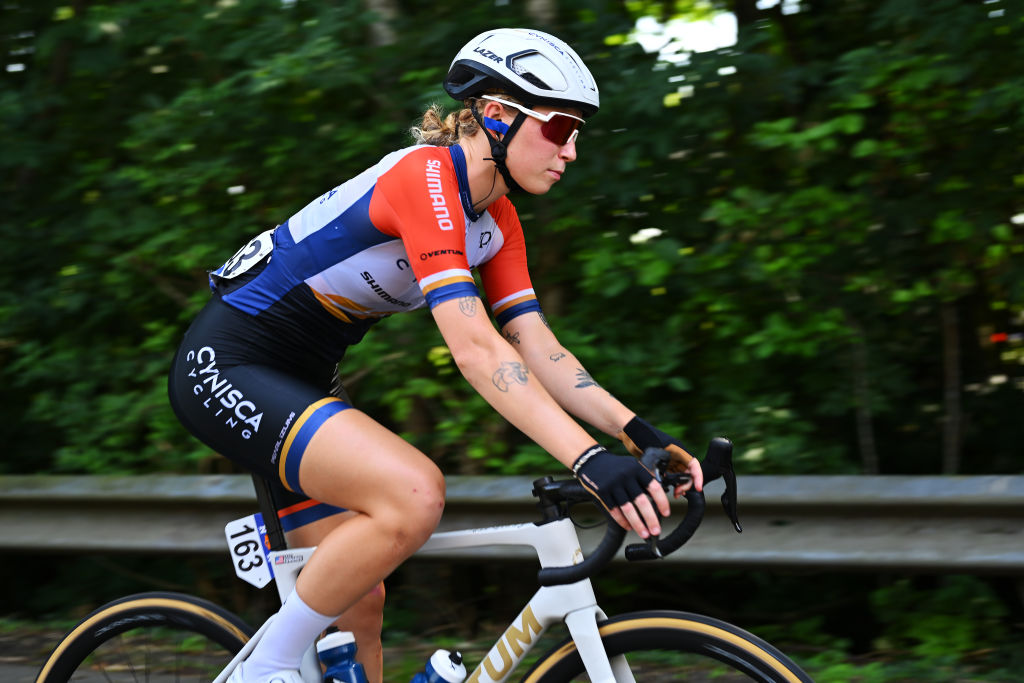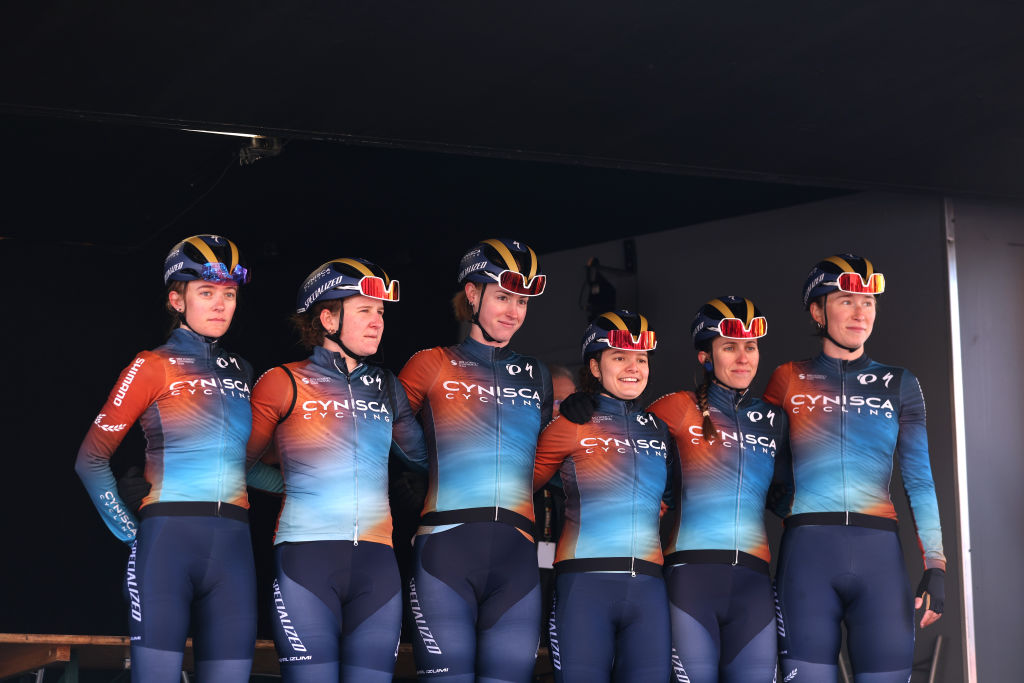This week, the US-based women’s Continental team Cynisca Cycling sent out a plea for $1 million in sponsorship before August 15 to help the team “keep their dream alive”. Why August 15? Cynisca’s General Manager Robin Farina explained to Cyclingnews that the funds will help the team step up to the ProTeam level so they can aim for an invitation to the Tour de France Femmes in 2026.
“We’re not closing down shop right now or in the near future,” Farina said. “We have support and are working hard to keep the program running because it’s a priority for us.
“Three years is a great run, but we haven’t accomplished our main goal yet. So we’re actively looking for people who have supported cycling in the past, women who own businesses, and others interested in sponsoring a professional women’s cycling team at the highest level.”
You may like
With the $1 million, Farina has plans to keep a feeder team of eight riders at the Continental level and a 10-rider ProTeam, which would allow the team to call up riders to fill rosters throughout the year.
“Women’s professional cycling needs what the men’s side has: a bigger development squad to pull from. We need to be able to bring riders in and out of the top level when they’re ready. In the past couple of years, we’ve had to throw them to the wolves. Women’s cycling is currently a sink-or-swim situation. There aren’t many places for riders to go unless you put them in the biggest races and let them see how they do.”
However, getting to the biggest races takes money. The team have a European base in France, with the team’s owners’ connections securing them a location for their service course near the Pyrenees at the Château de Saint-Martory, where riders can stay and train on the climbs of the Tour de France. They’ve had a European calendar of mostly lower-level UCI races, but have also competed in their first WorldTour races at the Tour of Flanders and the Amstel Gold Race this year.
The August 15 deadline for funding is the UCI’s date for the first step in applying for the ProTeam license, which Farina says the team intends to do. Whether they can complete the process depends if the funds arrive in time for when the team have to give the bank guarantee and demonstrate their financial stability to the UCI.
The latest race content, interviews, features, reviews and expert buying guides, direct to your inbox!
Cynisca have so far operated on a budget from private donors and other industry sponsors, including Specialized, Shimano and Pearl Izumi, but Farina explained that relying on individual donors is not sustainable. It’s a situation the sport has seen numerous times: rich benefactors come in, support a team until they lose interest or figure out the sport’s return on investment is not so concrete.
“Cycling seems to go through this every year,” Farina said. “It’s a matter of finding the right person at the right time and getting the most out of their passion for as long as they’re willing. The real issue is that a person can only write a check for so long before they get fatigued. This has happened over and over again in our sport, and we need to find a way to prevent that from being our go-to model.
“Cycling teams will always be hard because we don’t have that consistent revenue. It’s like selling seats, but we don’t have an arena, we don’t have ticket sales.”
The team is a non-profit organisation that performs community services like cycling clinics for children. That makes sponsorship tax-deductible and more attractive to investors, but it has still been a struggle. They have tried crowdfunding but it’s not a sustainable model.
“We’ve seen the writing on the wall. It’s never easy to come up with funding for cycling teams. It’s always historically been difficult and it’s always going to continue to be a difficult process,” Farina said.

Tess Edwards racing at the Baloise Ladies Tour in 2024 (Image credit: Getty Images)
“A lot of our funding has come from private funding. A best-case scenario would be a corporate sponsor that can come on through 2028, but at the same time, we’re also very realistic about how cycling teams operate.”
The whole business model of pro cycling is in “a fragile state”.
“You’re always tiptoeing. And investors, by nature, look for positive returns. And so if there’s no money coming in, if you’re just writing cheques – that’s the reality of cycling: no team on the planet is making money, and if they are, I want to know how!”
Farina hopes that a potential corporate sponsor can see that supporting a women’s team provides a lot more for the cost than a top-level men’s team.
“You can get involved with less investment, which is a fact for any investor. You can make an impact in women’s sports much more easily than you can in men’s. A men’s WorldTour team like UAE operates on a $60 million annual budget, maybe $15 million for other teams. For a women’s team, we’re asking for a million dollars. While that’s a lot of money, in the grand scheme of things, it’s not a lot to compete at the highest level — it’s a pretty good bargain.”
Should the team meet their fundraising goal, they have high aspirations and a deep pool of talent to draw from, with Farina revealing that she is getting 25 to 30 resumes a day from riders looking for teams.
“The market is hot, so while I would love to have the money in the bank right at this moment, I’m not concerned about talent. Am I going to be able to hire a Lotte Kopecky tomorrow? No, but, I do think we have done a good job of recognising talent and helping them thrive. We had Mara Roldan last year and now she’s on [Picnic-PostNL] and Fiona Mangan [Winspace Orange Seal], who has moved on, and raced the Tour this year.”
Farina has big goals if the team score the golden ticket of corporate sponsorship.
“Our goal is really to be in the Tour de France Femmes in 2026, and then also, produce some Olympians for LA 2028. I mean, that has always been our, our trajectory and our belief of success,” Farina said.
“The goal is really to take riders from the US, younger riders, and give them the full professional experience in Europe, racing against the best, and then produce a Tour de France winner from North America.”
Not meeting the goal might mean the team continues at the domestic level but shuts down their European base, which would be a shame, Farina said.
“Shutting down our cycling team isn’t just about ending a sports programme. It would mean shutting down a business model that includes infrastructure and tourism. We have a cycling villa in the heart of the Pyrenees, which allows us to bring sponsors over for experiential opportunities, especially when the Tour de France is nearby.
“This base in France is a fantastic thing we’ve built, and it’s particularly important for our riders. It gives them a place to stay, along with our headquarters, bikes, and cars, so they don’t feel lost when they move to Europe. We’re doing everything we can to keep this program going and should have a clearer picture in the next 20 days.”

